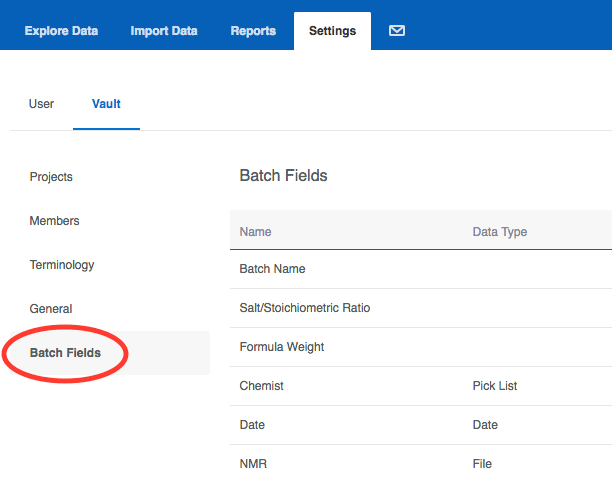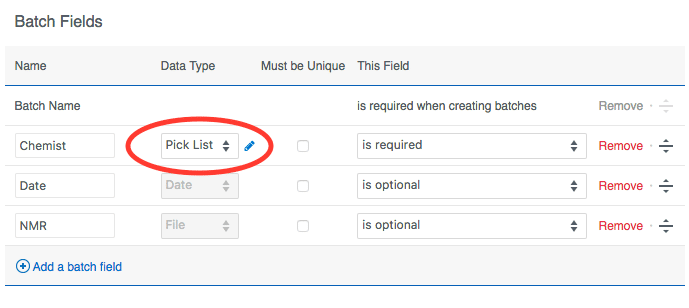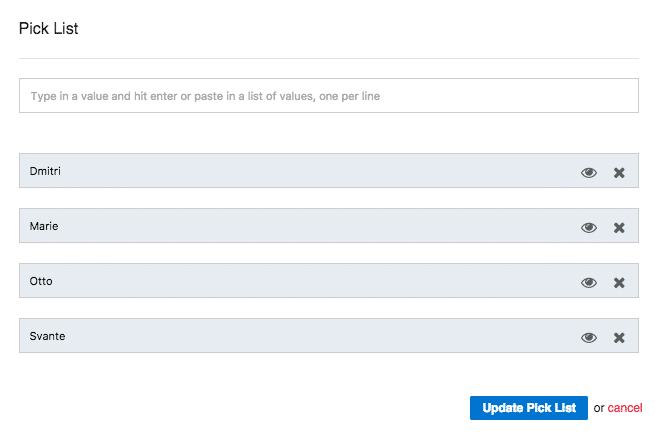This release allows you to set controlled vocabulary for batch fields using pick lists.
Batch Fields (formerly known as Registration Rules) Batch fields used to be called registration rules, and you can find them in the same place under your Vault settings:
 We introduced pick lists for readouts (protocol data) in the
last release, and now they are available for batch fields as well. The new pick list data type allows vault administrators to define data dictionaries and control the vocabulary of permissible values for individual batch fields.
We introduced pick lists for readouts (protocol data) in the
last release, and now they are available for batch fields as well. The new pick list data type allows vault administrators to define data dictionaries and control the vocabulary of permissible values for individual batch fields.
 Clicking the pencil icon will bring up the pick list editor. You can enter allowed values individually or paste in a whole list all at once. If you want to retire or decommission a value without removing it from existing batches, you can click the eye icon to "hide" it. Existing data will remain, but that value will no longer be allowed for new batches.
Clicking the pencil icon will bring up the pick list editor. You can enter allowed values individually or paste in a whole list all at once. If you want to retire or decommission a value without removing it from existing batches, you can click the eye icon to "hide" it. Existing data will remain, but that value will no longer be allowed for new batches.
 Migrating Existing Data to Pick Lists You can migrate batch fields by exporting the existing data, creating a new pick list batch field, reimporting into the new pick list batch field, and deleting the old one. For readout (protocol) pick lists we have a migration tool that can convert the data for you. Please contact
support@collaborativedrug.com if you have any questions about migration.
Other Changes
Migrating Existing Data to Pick Lists You can migrate batch fields by exporting the existing data, creating a new pick list batch field, reimporting into the new pick list batch field, and deleting the old one. For readout (protocol) pick lists we have a migration tool that can convert the data for you. Please contact
support@collaborativedrug.com if you have any questions about migration.
Other Changes
 We introduced pick lists for readouts (protocol data) in the
last release, and now they are available for batch fields as well. The new pick list data type allows vault administrators to define data dictionaries and control the vocabulary of permissible values for individual batch fields.
We introduced pick lists for readouts (protocol data) in the
last release, and now they are available for batch fields as well. The new pick list data type allows vault administrators to define data dictionaries and control the vocabulary of permissible values for individual batch fields.
 Clicking the pencil icon will bring up the pick list editor. You can enter allowed values individually or paste in a whole list all at once. If you want to retire or decommission a value without removing it from existing batches, you can click the eye icon to "hide" it. Existing data will remain, but that value will no longer be allowed for new batches.
Clicking the pencil icon will bring up the pick list editor. You can enter allowed values individually or paste in a whole list all at once. If you want to retire or decommission a value without removing it from existing batches, you can click the eye icon to "hide" it. Existing data will remain, but that value will no longer be allowed for new batches.
 Migrating Existing Data to Pick Lists You can migrate batch fields by exporting the existing data, creating a new pick list batch field, reimporting into the new pick list batch field, and deleting the old one. For readout (protocol) pick lists we have a migration tool that can convert the data for you. Please contact
support@collaborativedrug.com if you have any questions about migration.
Other Changes
Migrating Existing Data to Pick Lists You can migrate batch fields by exporting the existing data, creating a new pick list batch field, reimporting into the new pick list batch field, and deleting the old one. For readout (protocol) pick lists we have a migration tool that can convert the data for you. Please contact
support@collaborativedrug.com if you have any questions about migration.
Other Changes
- A molfile structure representation is now included when retrieving molecules via the API.
- Molecules can now be deleted without first removing the associated data if you have write access to all of the molecule's projects. After you confirm that you really mean it, the molecule and all associated data are deleted.
Other posts you might be interested in
View All Posts
CDD Vault Updates
4 min
December 11, 2020
CDD Vault Update (December 2020): Manage Molecule Fields and Registration Settings; Improvements to Run and Protocol Modified Dates
Read More
CDD Vault Snack
2 min
April 26, 2021
Vault Snack #13 – Using Batch Link Fields to Track Relationships Between Entities
Read More
CDD Vault Updates
2 min
February 25, 2023
CDD Vault Update (February 2023 [#2]): Annotate Runs of a Protocol, Customize Molecule Pop-Up in Visualization, Query Structures in Ketcher
Read More


